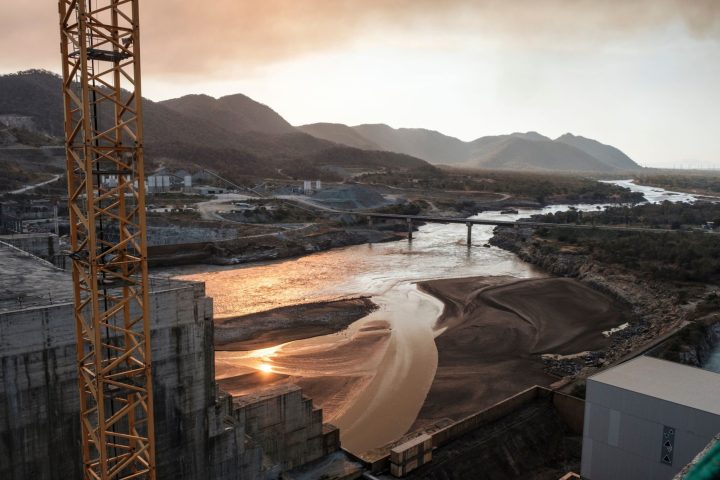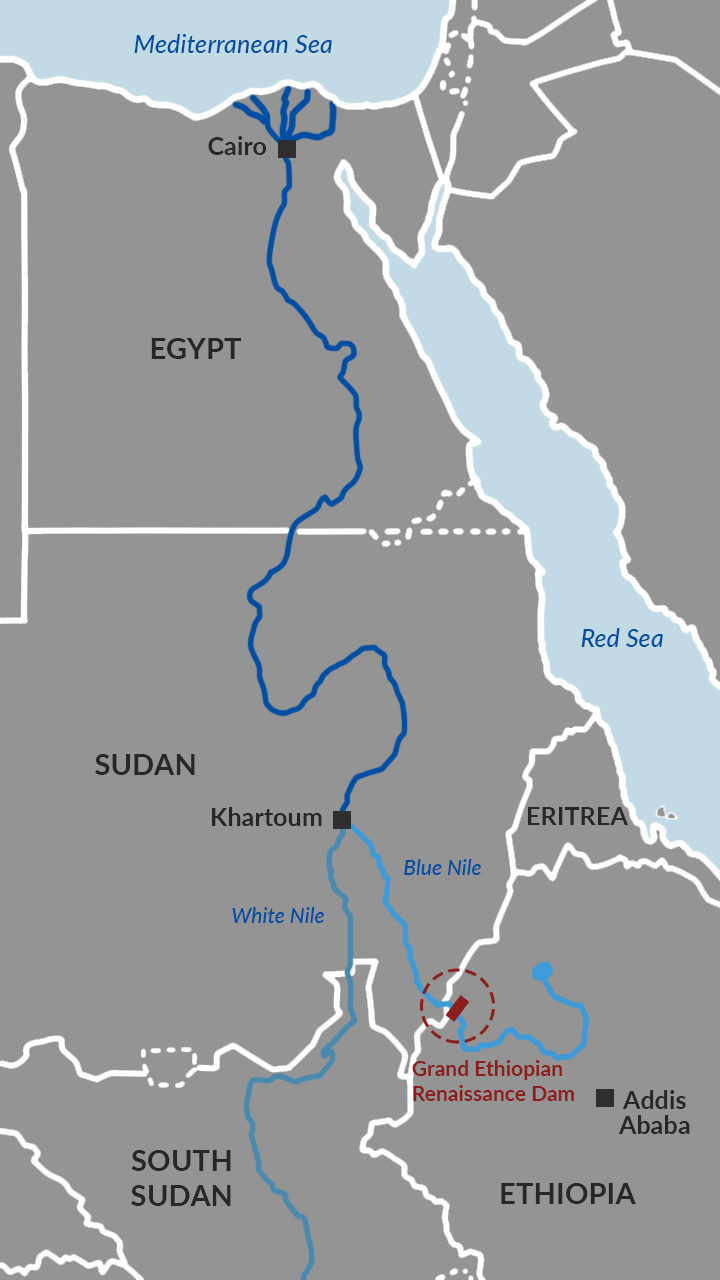ISS TODAY OP-ED
Grand Ethiopian Renaissance Dam is a fait accompli, so it’s time to get real

The now irreversible dam project needs to be managed as both an Ethiopian and a shared resource.
With the fourth annual filling looming in June and construction about 90% complete, the contentious Grand Ethiopian Renaissance Dam (Gerd) and hydroelectric power plant on the Blue Nile seems to have become a fait accompli, despite Egypt’s misgivings.
So it’s surely time for Ethiopia, Egypt and Sudan to turn from threats, bluster and high-handed nationalism towards cooperating to help make this huge reservoir work for the greater good of all.
Gerd has slid off the regional and international radar screen for the past few years, because of distractions such as Covid-19, the war in Ethiopia and the turbulent transition in Sudan, which recently flared into vicious fighting between two military generals. Abdel-Fattah al-Burhan, head of the Sudanese Armed Forces, and Mohamed Hamdan Dagalo (Hemedti), head of the paramilitary Rapid Support Forces, are also the head and deputy of the Sovereignty Council running Sudan.
Read more in Daily Maverick: Sudan’s Bashir and allies out of jail, Khartoum fighting flares

Location of Gerd on the Nile River. (Graphic: Supplied by ISS Today)
It’s been a while since any serious negotiations between Ethiopia, Egypt and Sudan have taken place – at least visibly.
Meanwhile Sudan, initially on Ethiopia’s side in the dispute, before switching to Egypt, now seems to have returned much closer to Ethiopia. This is apparently partly because of progress by Ethiopia and Sudan in resolving their rival claims to the fertile border region of Al Fushqa. Sudan, it’s also been suggested, has begun to appreciate the value the Gerd could have in mitigating the annual flooding along its section of the Nile.
It’s not quite clear, though, how the outcome of the current fighting in Sudan might affect its Gerd position. Jemima Oakey, Azure Strategy water specialist, says we don’t know if a triumphant Hemedti might try to claim Al Fushqa, thereby derailing any understanding with Ethiopia on Gerd.
Meanwhile, though, it’s clear that Egypt has grown more isolated in its fierce opposition to the dam, which it still presents as an existential threat because of its almost total dependence on the Nile’s waters. Around 97% of Egypt’s population of 106 million people live along the Nile and depend on it as a source of fresh water.
Contentious construction
During over a decade of construction, Egypt has intimated that it will do whatever it takes to stop completion – hinting even at military action. As recently as March 2023 Egyptian Foreign Minister Sameh Shoukry told Cairo Talk that, “All options are open, and all alternatives remain available,” for dealing with the dispute. This was widely interpreted as meaning the military option was still there.
Most analysts dismiss this possibility. William Davison, Ethiopia specialist at the International Crisis Group, told ISS Today a military attack “was never likely and now it would be highly unlikely”. Such an attack would result in massive flooding of Sudan’s Blue Nile River, an eventuality Egypt would not contemplate.
Yet no substantial negotiations seem underway. Over the years various countries and institutions such as the United States, World Bank and African Union (AU) have tried to break the impasse, without success. Not much seems to have happened for a while.
The AU is probably still the official mediator but doesn’t seem to be active on the file. Egypt has accused Ethiopia of automatically referring to the AU whenever any issue arises. But only, Cairo suggests, because it knows the AU will do nothing, thus preserving the status quo and allowing Ethiopia to continue building and filling the dam unimpeded.
Davison notes, however, that the United Arab Emirates has hosted some rather covert meetings over the past year or so, complementary to the AU effort, the last apparently in December. “Apparently there were some quite constructive, more technical discussions. But no signs of a breakthrough in the form of negotiating any form of a tripartite agreement.”
Davison said with the imminent fourth annual filling, the dam was becoming a fait accompli. “And so it becomes less and less likely Ethiopia will make the concessions Egypt requires.” Cairo’s demands have mainly been for a legally binding agreement on water flows, particularly in drought years, and assurances that Cairo and Khartoum will be consulted before Ethiopia embarks on any other dams on the Nile. Davison believes the possibility of a pause or downsizing of Gerd, which Egypt has wanted, seems to have passed.
The fact that Egypt had managed to keep its own Aswan High Dam mostly full over this period also seems to have defused tensions over Gerd, though this might have been largely good luck due to relatively healthy rainfall during the Gerd filling period so far, he says.
The massive instability in Ethiopia and now Sudan over the past two years has clearly been a distraction from negotiation efforts, allowing Ethiopia to continue unhindered to establish Gerd as an ever more immovable fact on the ground. This rather unsettled situation suggests the three parties need to kickstart negotiations with a new mandate, or at least a new attitude, based on the reality that the Gerd isn’t going away.
Egypt should stop making threats and start thinking about the positives Gerd could offer. Conversely, Ethiopia should be less fiercely independent in its management of the dam and more responsive to Egypt’s and Sudan’s need for assurances about their vital water supply.
This could be the basis for a more scientific and less political and confrontational approach.
Hagen Koch, a Potsdam Institute for Climate Impact Research senior scientist, told Deutsche Welle that, “Great benefits could be derived if Egypt’s Aswan High Dam and Ethiopia’s Gerd were operated together”.
He said because the Aswan High Dam’s reservoir, Lake Nasser, lay at a much lower altitude than Gerd, where temperatures were higher and covered four times its surface area, evaporation from Lake Nasser was much higher. So it made sense to store more water in Gerd than in Lake Nasser, making more water available to both countries.
Oakey likewise suggested to Arab News that Egypt, Sudan and Ethiopia set up a data-sharing agreement to manage water flows from Gerd. This agreement could include guaranteed water releases during droughts. That would be a way of obliquely approaching Egypt’s demand for greater certainty about its water supply. Ethiopia though has consistently rejected being bound in any way.
Clearly the Blue Nile, though a vital Ethiopian resource that could potentially supply electricity to the 60% of Ethiopians who now lack it, is a common and vital resource for all three countries. So its management demands collaboration, not confrontation, however such cooperation is framed. DM
Peter Fabricius, ISS Consultant.
First published by ISS Today.


















 Become an Insider
Become an Insider
Peter, it seems to me that the Egyptians and Sudanians are forgetting something: One of the main benefits that Ethiopia have built the dam for is the electricity generation of the hydro-electrical plant at the dam, which, being about 5.5GW, will not just benefit Ethiopian farming, but also, as I understand, the Ethiopian railways and electric trains, and will also enable Ethiopia to make money by even selling some of it to neighbouring countries. So the dam has not been built to stop the river, but to keep the water flowing (through the hydro-electrical plant). But that then means that the water still goes down the river and still reaches Sudan & Egypt. But if they are fearing dependence on decisions of the Ethiopian government, then the AU must just get their act together. I mean, if nothing else works, the three countries, and even including some other neigbours, can form a joint committee controlling the water flow out of the dam, say calling it the Grand Rennaisance Dam Catchment Area Controlling Committee or something. Is it not time that all these countries realise their interdependency, specifically BECAUSE they are all dependent on the same river?
. . . Then there is another issue that is relevant here: The Blue Nile (the one that runs through the GERD) seems to me like the smaller of the two Niles (the White Nile coming from Lake Victoria in Kenya being the other one). So the White Nile will still give Egypt & Sudan the life-giving water. So what is the real motivation for the Egypt-Sudan antagonism? Is it not rather a power struggle about who is the dominant country in north-east Africa? I understand from Kenyan business people that even as far south as Kenya, Egypt’s influence is extraordinarily high. Is the concern about water not maybe just a facade for a struggle for regional dominance?
The Lesotho Highlands Water Project and hydro electricity supply from the Cahora Bassa dam are similar in terms of geopolitical significance, also the Ataturk dam in Turkey, controlling the flow of the Euphrates and Tigris rivers, a vital source of water for Syria and Iraq. The dam is managed in terms of a treaty between Turkey and its downstream neighbours.